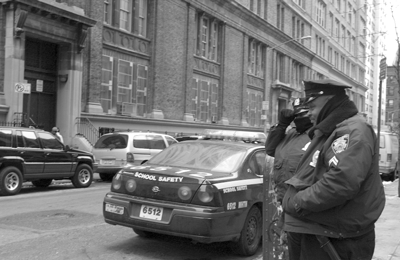By Hemmy So
Washington Irving High School has just shed its “impact school” label thanks to major decreases in crime and disorder over the past year. Deemed one of the most violent schools in New York City in 2003, it was among 16 designated “impact schools” as part of Mayor Bloomberg’s School Safety Initiative launched last January. After a year of increased security, rigorous discipline, code enforcement and changes in school conditions, Washington Irving and four other schools will transition out of impact school status.
Mayor Bloomberg and Schools Chancellor Joel Klein made the announcement at a Jan. 3 press conference.
“A year ago, we promised to provide a safe atmosphere, free of fear and intimidation to every student who wants to learn, and we are making good on that promise,” the mayor said. “The atmosphere has improved dramatically for students and teachers at our impact schools, so much so that five of them will be transitioned out of impact status.”
At Washington Irving, at Irving Pl. and 17th St. in Gramercy, major crime has dropped by 72 percent and overall crime has fallen by 50 percent. For all 16 impact schools, major crime is down 43 percent and overall crime decreased by 33 percent compared to the same period last year.
When Washington Irving fell under impact school status last January, the school received seven officers from a 150-member mobile School Safety Task Force to help combat crime. Ironically, the addition of those task force members in February 2004 did not significantly increase the number of police patrolling the school and surrounding area. After a protest three months earlier by students, parents and teachers objecting to the dangerous conditions at the school, Washington Irving saw a sudden boost in police presence.
Two highly publicized events during the 2002-2003 school year caused a focus on safety issues at Washington Irving. Both instances involved students who threw chairs from the building’s upper floors. The hurled chair caused only car damage in the first instance, but the next incident injured a pregnant woman as she walked past the school. Teachers also witnessed students bringing guns and drugs to school and robbing other students.
To help cure such problems, impact schools like Washington Irving not only added more police on the premises but also adopted a zero tolerance policy for New York City Discipline Code infractions. Responses to infractions included peer mediation and negotiation, anti-bullying awareness and suspensions by the principal and superintendent.
“It creates a presence in the buildings when you have police officers,” said Dr. Denise DiCarlo, Washington Irving’s principal. “Students know they’re there, so they’re not apt to try something illegal when a police officer’s there.” Police could also help students with bullies and off-campus problems involving other students, DiCarlo said.
Gregg Lundahl, a social studies teacher at Washington Irving and the United Teachers Federation chapter representative, noted the effectiveness of suspensions. “The more you press these superintendent suspensions and principal’s suspensions, the more crime will decrease in schools. And we believe that’s true in disruption and anything else,” he said.
Washington Irving also has teachers act as disciplinary deans, monitoring the halls and cafeteria and checking students’ I.D.s upon entry to the school.
“We have many deans inside the building who bend over backwards to do their jobs right and clear the halls. Clearing the halls is absolutely essential, and we have clear halls now,” Lundahl said. “We had bands of 200 kids roaming the halls unbridled a little over a year ago.”
In transitioning out of impact status, Washington Irving will see fewer police officers and school safety agents. But the Department of Education promises to continue to provide additional regional support and closely monitor the school. After the first 90 days of the transition period, D.O.E. plans to reassess the five schools to ensure continuing progress.
DiCarlo has faith that the programs begun last year as part of the initiative will continue to help maintain a safer school. The peer mediation program and violence prevention programs will remain in place, as will orientation classes on schools rules.
“We’re not changing anything because we’re out of the status. This is how we’re keeping the tone. If you changed that and lightened up, everyone would think, ‘O.K., now we can cut class,’ ” DiCarlo said.
While Lundahl applauds those programs and the change in tone at the school, he said teachers have already felt pressure to ease up on disciplining students. “The concern is after the attention wanes, will it be business as usual — which is stop suspending so many kids, the occasional parent who says, ‘Why are you suspending my child?’ [and] the Department of Education bending to that pressure, while overlooking the overall big picture, which is orderly halls, orderly classrooms that you can teach in,” he said.
For now, however, teachers, administrators and students at Washington Irving are proud of their accomplishments in making the school a safer place.
“I think everyone’s very happy about it, because they feel proud of this school and they weren’t happy last year,” DiCarlo said. Because most of the students like their school, they felt badly when the school was put on the impact list, she added. “There’s a very positive tone right now. Everyone worked together to make it happen, a real community effort.”
The Union Square Partnership, which has worked with Washington Irving for over a decade to provide additional resources and infrastructure enhancements, applauded the school’s achievements.
“With the business community’s continued support and by marshalling resources to strengthen their security systems, Washington Irving High School will continue its efforts to make significant progress to create a safer school atmosphere where the academic needs of the students can continue to flourish,” Karen Shaw, executive director of the Union Square Partnership, said in a statement. “The Partnership looks forward to continuing our support of W.I.H.S. and its growth and movement forward toward being an exemplary model of a ‘campus’-style school, with small learning communities working within a large learning complex.”
The other four schools transitioning out of impact status are M.S. 222 in the Bronx, South Shore and Franklin K. Lane High Schools in Brooklyn and Far Rockaway High School in Queens. Six schools have now been added to the impact schools list, including Lafayette and Abraham Lincoln High Schools in Brooklyn, John Bowne and Springfield Gardens High Schools in Queens, Norman Thomas High School on E. 34th St. and Park Ave. S. in Manhattan and Harry S. Truman High School in the Bronx.






































